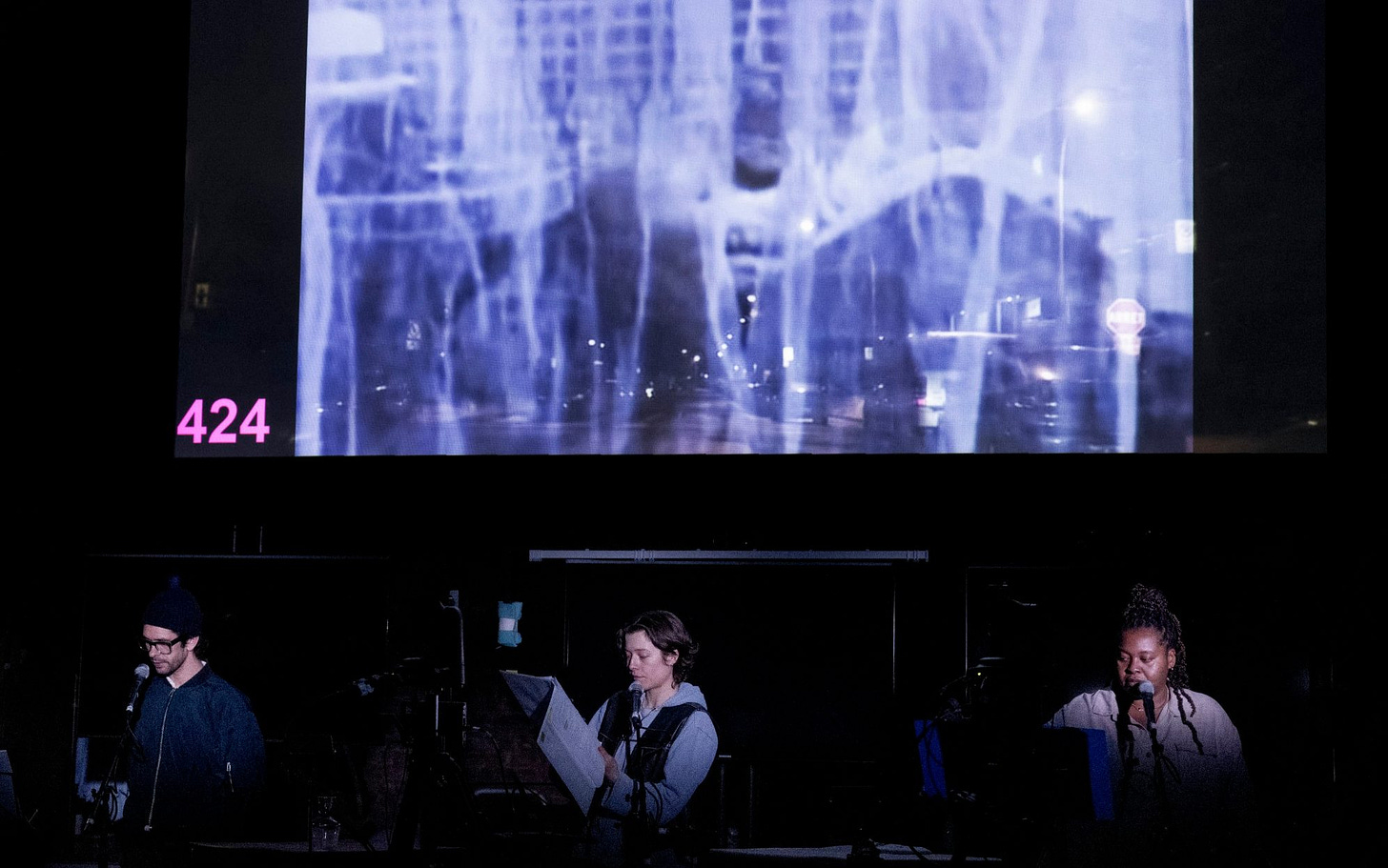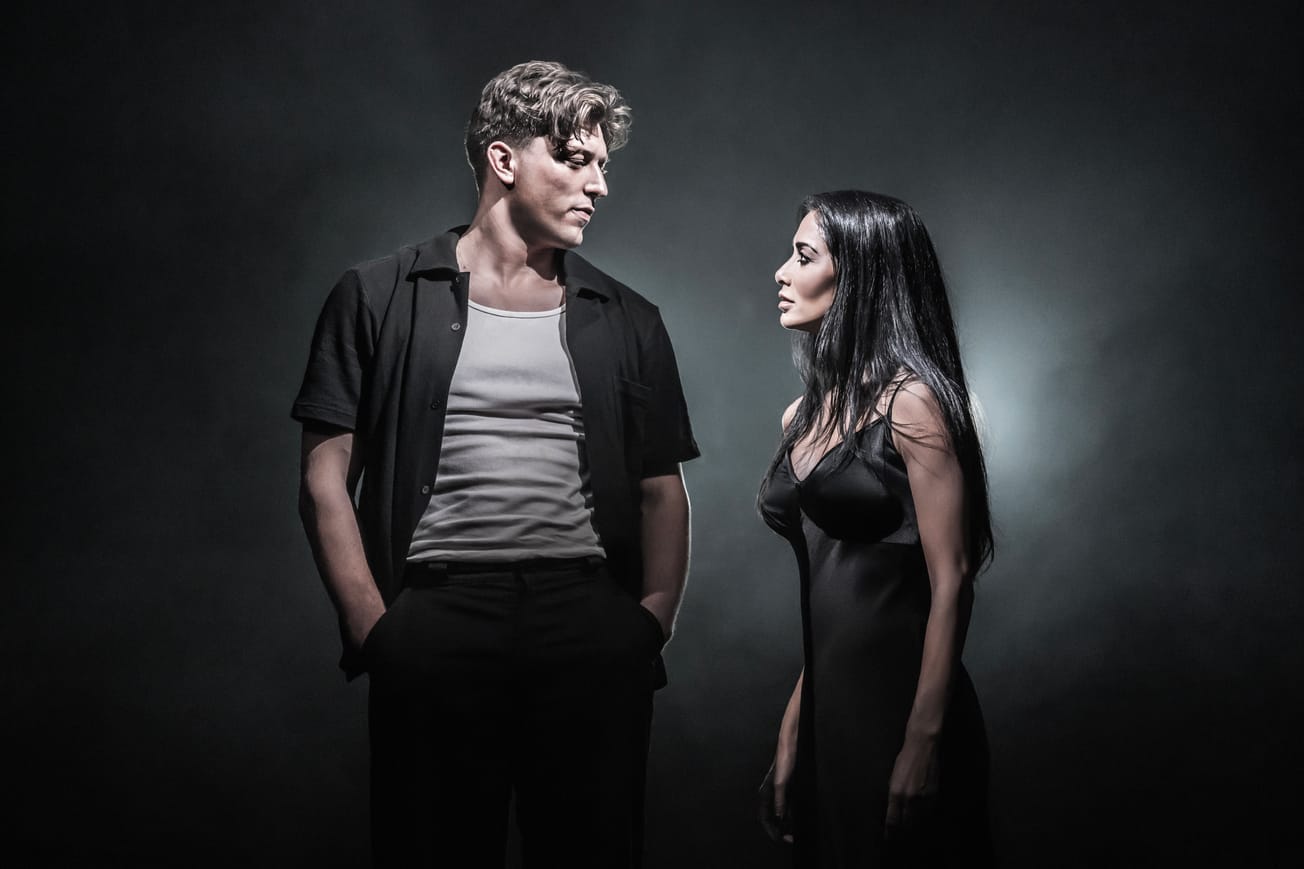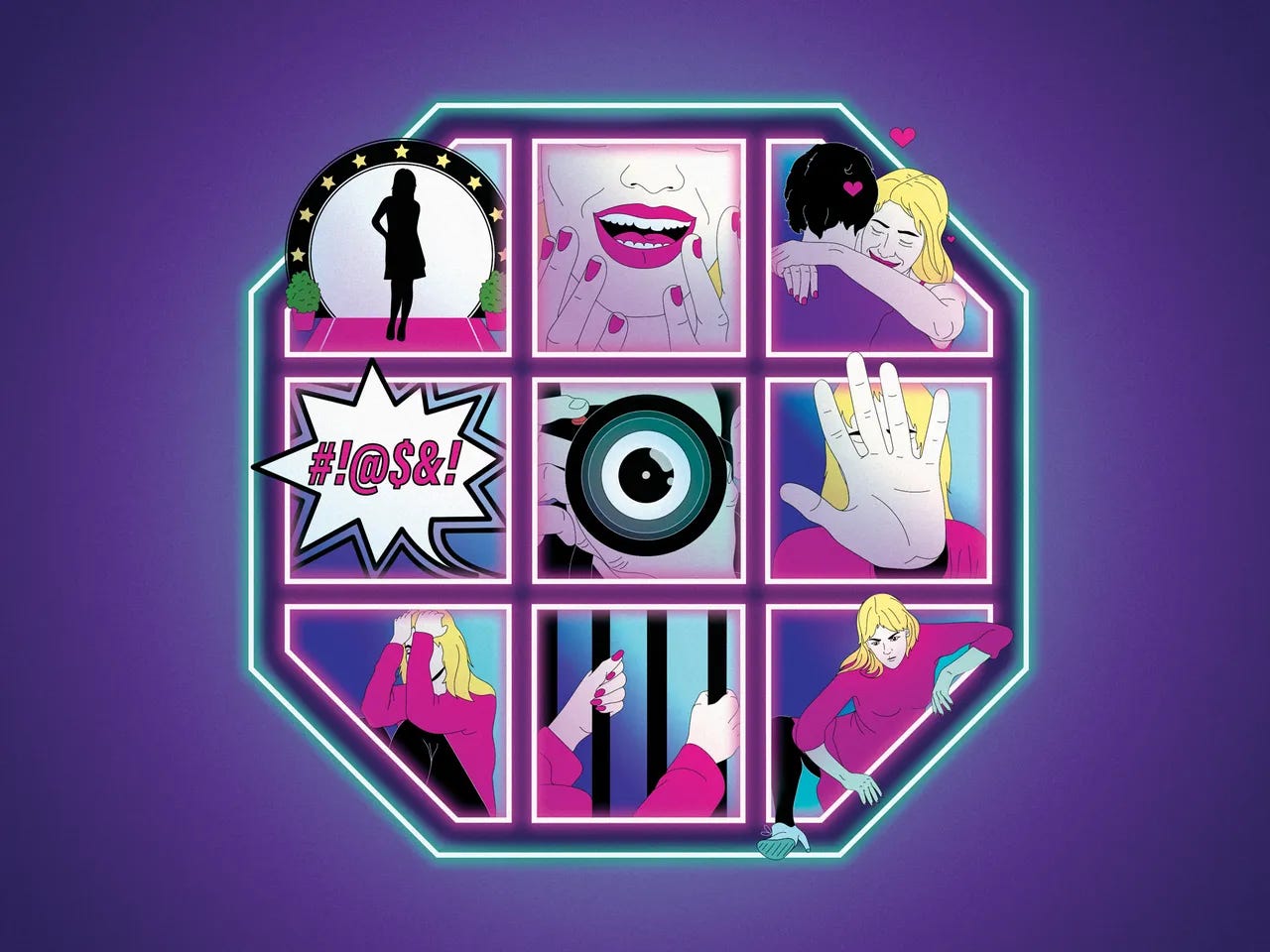Happy Friday!
Since we last spoke, I’ve been to the theatre twice, both times to see the work of a director who aspires to be an adjective.
The first play was Mitchellesque: Bluets at the Royal Court, adapted from Maggie Nelson’s book and starring Ben Whishaw. Everything was enslaved to director Katie Mitchell’s vision of “live cinema,” which meant Whishaw and his two co-stars standing, trapped in one spot, behind cumbersome tripods, constantly being supplied with props on trays by stage hands.
You could barely see the actors, so it made much more sense to watch the big-screen projection above them, which wound me right up. I thought, as Jez and Mark in Peep Show did, that I might as well be at home watching Heat.
As for the play itself, well—I went with Sarah Ditum, and when I sent her the Peep Show clip on the way home, she sent me the Vulva performance from Spaced. Bluets is about the narrator’s relationship breaking down, and her friend becoming paralysed in an accident (the two were equated in importance) and the narrator being unable to get research funding to write about the colour blue. It was like a depressing version of having to look at someone’s holiday photos.
The second play was Lloydian: Romeo and Juliet at the Duke of York’s in the West End. It’s directed by Jamie Lloyd, who is a generation younger than Mitchell, but has also become associated with a very distinctive, and sometimes heavy-handed, style. This production is ostensibly a star vehicle for Tom Holland, but he’s not at all showy it—pleasingly, if randomly, Freema Agyeman is the standout as the Nurse—and in any case, Holland can’t compete with the VISION.
Jamie Lloyd’s Romeo and Juliet, like his recent Sunset Boulevard, is very loud (check), largely monochrome with splashes of blood-red (check), makes the stage feel yawning and empty (check), uses big spotlights (check) and features a jacked leading man in a white vest (check) walking around the backstage area while being filmed (check). Jamie Lloyd knows what he likes, and it’s delts and ventilation ducts.
He’s also given Tom Holland what one friend described to me as a “county lines” haircut:
(Actually, I actually quite liked the aesthetic, since the young, largely black and mostly London-accented cast speak the verse in a way that makes the play’s frequent use of “cuz” sound like “bruv”.)
But there is a problem. My date for the evening, who hadn’t seen the backstage area used like this before—the camera initially follows Holland for his first entrance from behind like a prize fighter, and he goes to “Mantua” up on the roof—was very impressed. Whereas I went, “yeah it was good, but I preferred when the guy in the vest had to sing as he came back into the theatre.” Like the jaded Caligula that I am, I wanted more.
While writing my book on genius, I’ve been thinking about the appeal, rewards and perils of having a very obvious style. If you come up with an innovation, it really pays to associate yourself with it repeatedly, to claim it as your own. Commercially, that also makes sense, because people will know what your brand represents and will turn up expecting it. Going to see a Jamie Lloyd play and finding everyone in pastels doing an Oscar Wilde comedy would be like turning up to a Take That reunion gig to discover they’ve decided to go country. If you buy a Rothko, you want it to have two big blobs of colour merging into one another. Imagine buying a Jackson Pollock and then having to tell people it’s a Jackson Pollock because it’s not a drip painting.
But by the time you’ve really claimed something, by repeated use, you’ve probably exhausted its possibilities in artistic terms—and you will certainly have wearied your most avid consumers (in this case, including theatre critics, who were largely unimpressed with both Bluets and Romeo and Juliet). How to balance the demands of a Personal Brand and remaining at the “green growing edge” of your creativity is a harder task than it looks from the outside.
Helen
Writing About America (New Statesman)
What can you offer, as an outsider writing America? “Outsider” is a slippery term, and I am aware there is a certain off-putting, self-regarding twinkle in the eye of someone who declares themselves to be one. The Bukowski-ish cool guy watching from the sidelines with a Scotch and a superior smile, writing “look at all these phonies” in his notebook. And some “outsider” positions are more comfortable than others. A European white man adrift in America I would recommend – all the delectable alienation, less of the physical danger. Though I come from a different nation state, I might be more comfortable in the corridors of US media power than some natural-born Americans. The US has a history of making its own outsiders, those not folded into the flag: new immigrants, native inhabitants and people taken there against their will – slaves and their descendants.
There are lots of ways of being an outsider in America, and many of them don’t require you to come from elsewhere. It’s a country made up of people trying to be American, even when they already are – a chorus of “I like to be in America” sung by people playing a part. Even someone as thoroughly American as John Updike thought of himself as “a literary spy within average, public-school, supermarket America”. It’s a nation full of spies in the supermarket, invisible men like Ralph Ellison’s; anthropologists like Zora Neale Hurston. Or Jerry, Elaine and George, investigating the secret canon of social case law: can you double dip a chip?
Unsurprisingly, I loved this essay—adapted from a lecture—by Jesse Armstrong, on writing about America as an outsider. It even mentions the Habsburgs!
Is ‘Love Is Blind’ A Toxic Workplace? (New Yorker)
When we first spoke, in February, Hartwell was vague about exactly what happened during filming: his N.D.A. is still in effect, and, as he made clear, there’s a legal difference between talking about abuse and disclosing “proprietary trade secrets.” But Hartwell said that in his short time on the show he felt “caught in the current” of the pods—the period when participants had marathon vulnerable conversations with strangers, falling in love or getting rejected, or sometimes both.
Hartwell didn’t leave of his own volition, he said; at the same time, he felt trapped, knowing that there was a fifty-thousand-dollar fine for quitting without a producer’s consent—a provision that was present in contracts through at least Season 5. (Coelen has said that Kinetic never collected on it.) Hartwell described to me what sounds like a breakdown: before that week, he considered himself a “stoic, levelheaded, chill, happy” person; in the aftermath, he was traumatized, angry, and confused. There was a twelve-hour period in his hotel room that he couldn’t account for: “The best way I can describe it is vague, dark shadows of despair.” His psychologist told him that it sounded as though he’d entered “a fugue state.”
Emily Nussbaum writes about the status of reality TV participants—broke, manipulated, isolated, put in deliberately uncomfortable situations, subjected to edits beyond their control—and how some of them are fighting back, with lawyers and a labor union. She mentions that the early phases of Love Is Blind, where contestants phones are taken away, and they spend hours having conversations between returning to their hotel rooms—are uncomfortably similar to the tactics used by cults.
Quick Links
“The imminent arrival of their fourth child, a girl they plan to name Industry Americus Collins, turns out to be only the first in a string of surprises – and one really shocking thing – that I will encounter during my day with the pronatalists.” Jenny Kleeman meets some very strange people dedicated to repopulating the world (The Guardian).
James O’Malley praises gov.uk, a vast government IT project that . . . seems to have worked? (Odds and Ends, Substack)
“In retrospect, this was a great idea. But I can certainly see how it could come off as the kind of thing where someone would say: “Wouldn’t it be cool if…” but that wouldn’t be taken seriously. Obviously it appealed to you. But — to go to your superpower — how did you manage to get all these other people and organizations involved with it?” How do you inspire other people? David Epstein talks to the man who made “Giving Tuesday” happen (Range Widely, Substack).
“Trying to make sure that your politics outlast you is a strong motivational driver. If you have a tool to make that happen, however ugly, the temptation is to use it. But it also leaves that tool available to those who will inevitably beat you as the wheel turns.” Emma Burnell on Labour factionalism (Substack).








As a filmmaker, what drives me nuts about 'live filming' onstage is that the laws of physics are annoyingly immutable, and the image on the screen is thus very clearly out of synch. Bad enough in theatre, but having seen it twice in operas, where one might have hoped that singing in synch with the music mattered - that is, if possible, worse.
"It was like a depressing version of having to look at someone’s holiday photos."
This is a really excellent description of a play I don't wish I could go see.